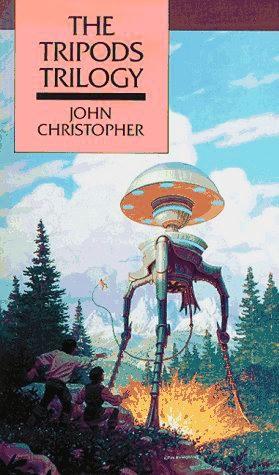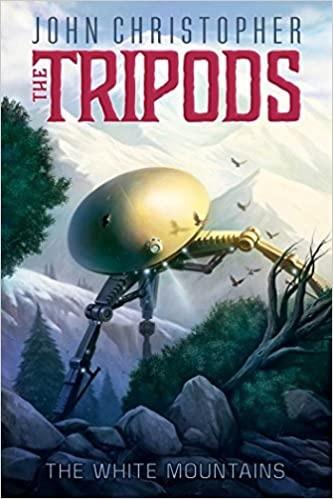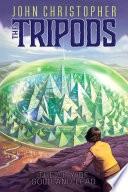Remembering The Tripods
For many science-fiction fans of a certain age, autumn Saturday afternoons of the mid-80s will always be associated with the adventures of Will Parker, Henry Parker and Beanpole. Alan from Malahide Library brings us some TV nostalgia as he remembers The Tripods.
Late one Saturday afternoon in September 1984, I settled down to watch the first episode of a highly publicised new BBC production, a science-fiction series called The Tripods.
Although set in the year 2089, the first episode opened in a tranquil, pastoral setting, a village somewhere in England. People apparently lived at a pre-industrial level of development.
Teenage cousins Will and Henry Parker were present for what was clearly an important event - Capping Day, when their older friend, Jack, was to be 'capped'
Amidst much excitement and joy, a gigantic, three-legged walking machine, a Tripod, entered the village and hoisted Jack inside itself. When returned to his family and friends, Jack wore what appeared to be a metallic cap upon his head. He was also strangely serene, apparently very happy and content. Celebrations duly ensued.
So, what exactly was going on? I was already fascinated, and over the following twelve half-hour episodes, I would eagerly follow the adventures of Will and Henry as they struggled for freedom in a world dominated by the Tripod.
The Tripods was an adaptation of the highly successful trilogy of novels for young adult readers, originally published during 1967 and 1968.

The author was the celebrated British science-fiction author John Christopher, whose novels for adults included the classic The Death of Grass (filmed as No Blade of Grass) and The World in Winter, as well as many other notable works for both adults and younger readers.
The first series of The Tripods, based on the novel The White Mountains, was adapted by Alick Rowe. As the series opens, Earth has apparently been under the domination of the Tripods for some unknown, though presumably considerable, length of time. 'Capping' at the age of seventeen is compulsory for everyone. The 'cap', a mind controlling device, eradicates curiosity and independent thought in the individual. There are some people whose minds are damaged by the capping process, and who become wandering vagrants.

Will Parker, himself only a year away from being capped, meets with such a vagrant, a man called Ozymandias. For Will and his cousin Henry, this will prove to be a life-changing experience. Ozymandias, who actually wears a false cap, tells of a place where people are free of the control of the Tripods, and reveals that he is part of a collective known as the Freemen. These people are planning and preparing to engineer the overthrow of their oppressive rulers and to attain for humans the freedom to once again shape their own lives.
Ozymandias encourages the boys to cross the Channel and to journey to the White Mountains (the Alps) where they can join the Freemen, who live there, in their struggle against humanity’s oppressors.
The first series of The Tripods would chronicle the adventures of Will and Henry on their journey. Shortly after their arrival in France, they would meet an intellectual and thoughtful French teenager called Jean-Paul, nicknamed 'Beanpole', who joined them in their mission.
The struggles of this trio, against daunting odds, made for compelling viewing. As well as the dangers posed by the Tripods and their human force, The Black Guard, Will and his companions also trekked through a landscape where every adult they encountered was blindly loyal to their enemy. They could expect little or no aid in their fight against the Tripods.
As an adolescent viewer, the struggle of this gang of teenagers, fighting to remain individuals in a world which forced conformity upon all and exterminated free thought, certainly struck a chord.
And of course, throughout the first series, the compelling mystery of who or what inhabited and controlled the monstrous machines remained unknown.
The conclusion of this series left viewers anxious for more, and a second series duly arrived on our screens in the autumn of 1985. Based on the second novel of the trilogy, The City of Gold and Lead, this time Christopher Penfold adapted the source material into twelve half-hour episodes.

This series began with the Freemen planning a daring venture into the heart of a Tripod city. Will and a German teenager called Fritz gain entry to the city by successfully competing in a series of athletic competitions. The winners are granted the privilege of entering the city to be servants to whatever beings reside there.
Will and Fritz plan to learn as much as they can about those who have enslaved humanity, hoping to learn of some means by which these beings can be defeated, and to return to the Freemen in the White Mountains with everything they have discovered.
The second series proved to provide just as much compulsive viewing as its predecessor, and viewers finally learned about the aliens who had conquered our planet and controlled the Tripods.
The final episode concluded with a shattering cliff-hanger. After a nail-biting escape from the alien city and pursuit, Will Parker and his companions return to the White Mountains, only to find The Freemen stronghold in ruins, destroyed.
"Has it all been for nothing?" Will asks in despair. Sadly, this last line of the series would prove prophetic.
The mid-to-late eighties would prove to be a troubled time for science-fiction drama on the BBC. The long-running serial, Doctor Who would soon suffer an eighteen-month hiatus from television screens, and in 1987 a series of poor decisions, including ridiculous scheduling, would thwart any chances for Chris Boucher's excellent and promising series Star Cops of gaining a dedicated viewership.
But The Tripods would prove to be the first victim, when BBC executives Michael Grade and Jonathan Powell decided to cancel production of the series due to what they regarded as disappointing ratings.
For the millions of fans who had eagerly awaited the concluding series of The Tripods with the adaptation of the novel The Pool of Fire, this decision was devastating. But we eventually had to accept that the autumn of 1986 would not bring a third series.
Over the years since its demise, The Tripods has retained a dedicated fan-base, and remains a notable venture by the BBC for many reasons. For its time a considerably expensive production by the British broadcaster, it is noted for being one of the first to feature computer generated graphics and special effects, utilising, for the time, a range of new technical equipment such as the Quantel Paintbox.
The memorable soundtrack, haunting and sinister, performed on synthesiser, perfectly captured the bleak and menacing mood of the series, and was provided by Ken Freeman.
And, of course, special mention must be made of the cast, particularly John Shackley (Will Parker), Jim Baker (Henry Parker) and Ceri Steel (Beanpole) who brilliantly brought the young protagonists of John Christopher's novels to life.
However, all was not quite finished with The Tripods just yet. In 1988, a prequel titled When the Tripods Came was published. In this work, John Christopher revealed how humanity originally fell under the dominion of The Tripods.

In March 2009, the B.B.C released The Tripods Series One and Two on DVD. This package included a booklet featuring the plans made by Alick Rowe for the third series. Details for all thirteen episodes were included, providing a glimpse of what might have been. The DVD set also included music made for the third series by Ken Freeman.
For many science-fiction fans of a certain age, autumn Saturday afternoons of 1984 and 1985 will always be associated with the adventures of Will Parker, Henry Parker and Beanpole, their struggles and determination to be individuals in a future world where free thought is crushed and conformity is paramount. For those taking the first, tentative steps into an adult world, their example was one to be remembered, valued and emulated.
Alan, Malahide Library